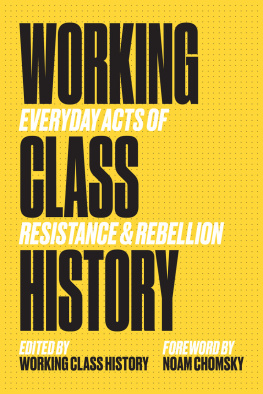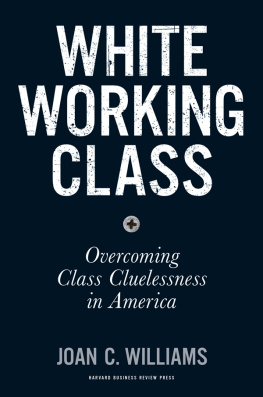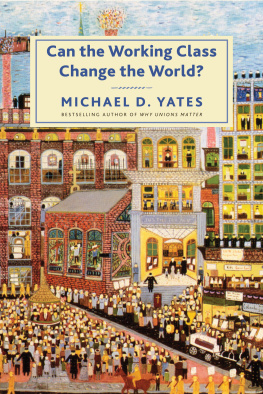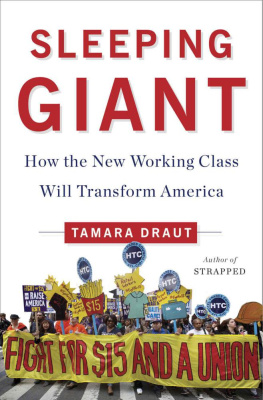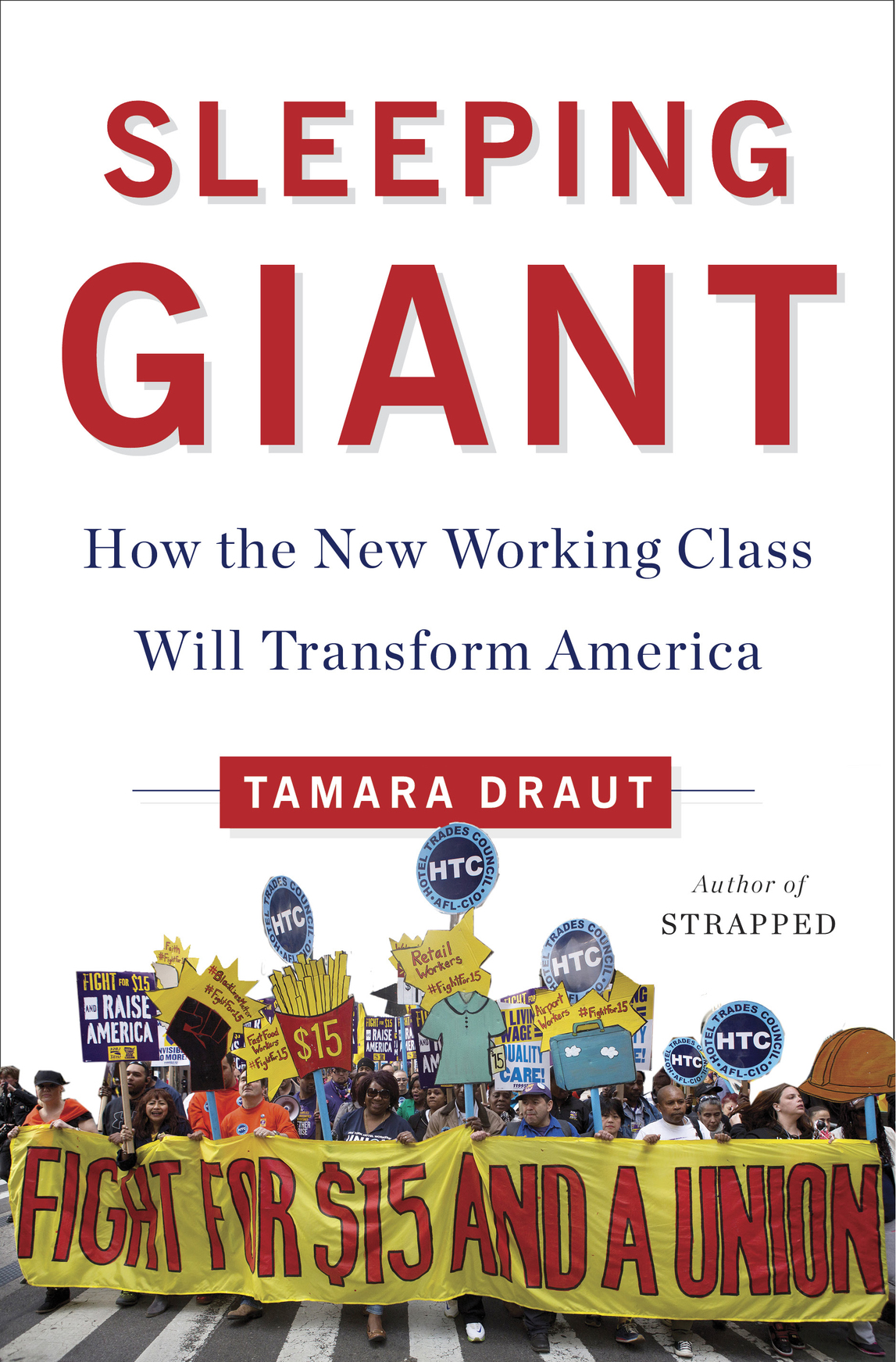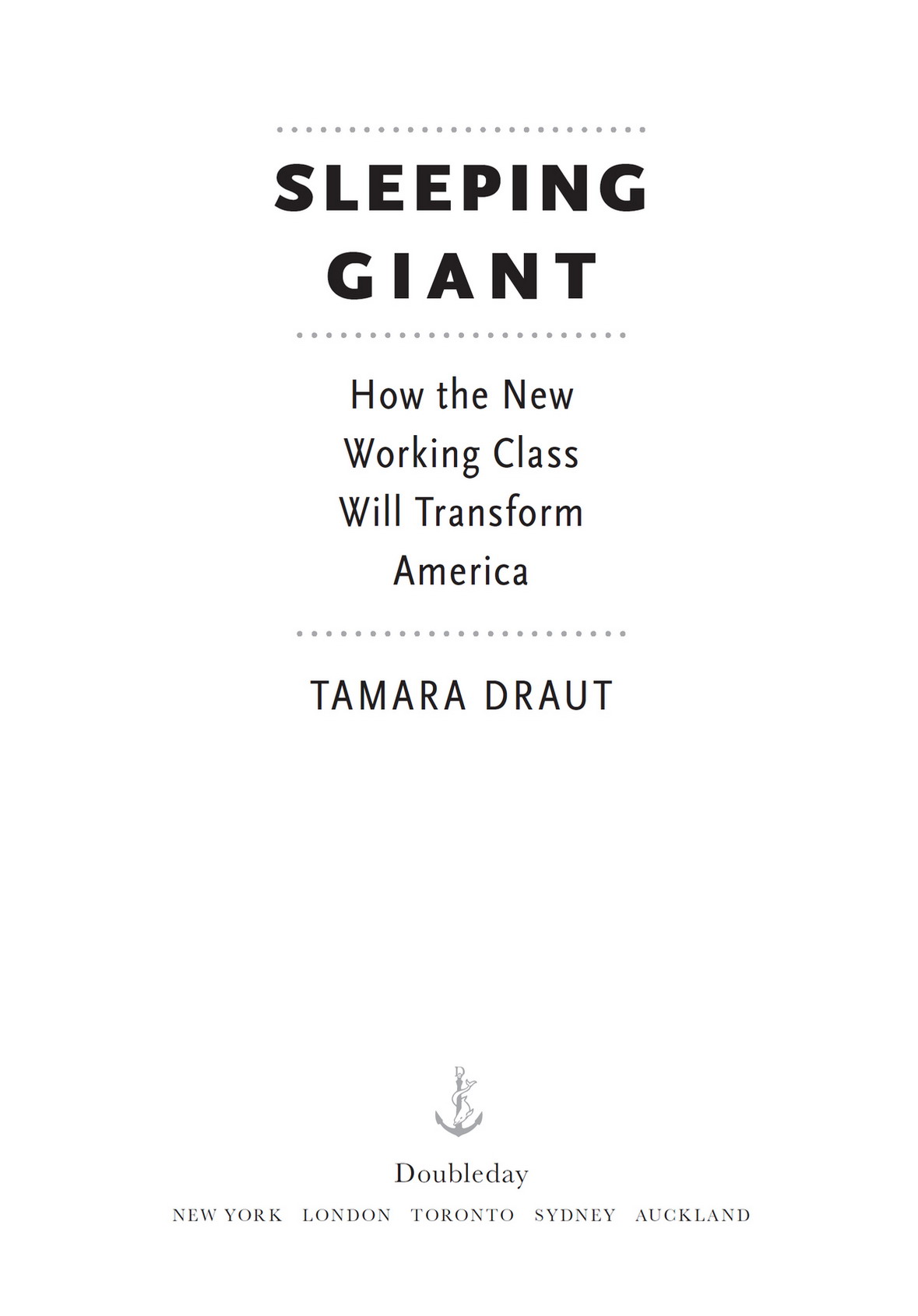All rights reserved. Published in the United States by Doubleday, a division of Penguin Random House LLC, New York, and distributed in Canada by Random House of Canada, a division of Penguin Random House Limited, Toronto.
DOUBLEDAY and the portrayal of an anchor with a dolphin are registered trademarks of Penguin Random House LLC.
Cover photograph Victor J. Blue/Bloomberg Via Getty Images
Draut, Tamara.
Draut.First Edition.
1. Working classUnited StatesHistory21st century. 2. Diversity in the workplaceUnited StatesHistory21st century. 3. United StatesEconomic conditions21st century. I. Title.
Servants, laborers and workmen of different kinds make up the far greater part of every political society. But what improves the circumstances of the greater part can never be regarded as an inconveniency to the whole. No society can surely be flourishing and happy, of which the far greater part of the members are poor and miserable. It is but equity, besides, that they who feed, clothe and lodge the whole body of the people, should have such a share of the produce of their own labor as to be themselves tolerably well fed, clothed and lodged.
Introduction
My father died a few short months after the city of Detroit declared bankruptcy. He was a steelworker, the epitome of the person you likely conjure up when you hear someone described as working class. White, male, hard hat and lunch pail, steel-toed boots, and a dark blue uniform hed bring home at the end of every shift and promptly throw in the washing machine. The earthy, sweaty, and metallic smell lingered in the laundry room after he closed the lid. He was Americas hero, the brawny backbone of American prosperity and a broad middle class the likes of which the world had never seen. These were the men who soldered, heaved, and secured Americas industrial might in the world, and as a result earned the pride and respect of our nation.
That working class is dead, Detroits bankruptcy a blunt symbol of its ultimate demise.
But the working class is not dead.
Its just different. No longer shuttered away in a factory, todays working class is interwoven into nearly every aspect of our lives. Its the black woman in a caretakers smock wearing special comfort shoes and a name tag above her heart. Its the white man in a uniform (which he had to pay for) who punches in each day and restocks the shelves of your favorite big-box store. Its the Latina home health aide who cares for your mom, the janitor who empties your office wastebasket, the woman who rings up your groceries, and the crew who fix the bumpy freeway you take every day to work.
Yet despite how interwoven this new working class is in our lives, we dont really know enough about it. Its members concerns dont shape the national agenda or top the headlines in major newspapers. Their stories arent featured in sitcoms, dramas, or movies. The words working class have been scrubbed from our social and political lexicon, rendering invisible the millions of workers who buttress the middle class at best and straddle poverty at worst.
But attention must be paid to the new working class. Our livesall of our liveswould grind to a halt if the working class waged a general strike. Its sheer scale in size and diverse demographics will shape the future of American politics. And our nations prosperity will be defined by whether we address its members declining living standards.
It was in the spring of 2013 that this new working class introduced itself to the world with coordinated walkouts of fast-food workers in major cities across the country. This took place just a few months before the cradle of our once blue-collar nation went bankrupt. But the old blue-collar nation typically paid its workers hourly wages of $17 or more. The fast-food workerswho clock in to one of the largest occupations in America todaywere protesting wages that hover around $8 an hour. What began as a movement among fast-food workers has since mushroomed into a major worker justice movement known as the Fight for $15, in which home-care workers, airport workers, adjunct professors, retail workers, and fast-food workers have all come together to fight for better wages and working conditions. It is the tip of the spear of the Sleeping Giant, staking a claim and fertilizing the seeds of a new working-class solidarity.
In just a few short years, the Fight for $15 has been able to claim significant victories, from consciousness-raising to policy changes in red states and blue states. In the 2014 elections, voters in Alaska, Arkansas, Nebraska, and South Dakota passed ballot measures to raise their states minimum wage. And voters in San Francisco approved a $15 minimum wage increase, matching Seattles groundbreaking increase. In 2015, Los Angeles joined the list of cities raising the minimum wage to $15 an hour.
For working-class people who arent engaged directly in the growing chorus of workers taking to the streets, the movement brings attention to their needs and struggles. But as important, the movement emphasizes the dignity and value of their jobs. Ive interviewed people all across this country, from the Bible Belt to the East Coast, from the Rust Belt to the Pacific Northwest, and one of the most common grievances they express is the lack of respect they experience in the workplace, and in our society more broadly. Whatever their job, the individuals I talked to described their work as meaningful and embedded with purpose, yet they also told me about the disrespect they get on the job from their bosses and in society from politicians.
For LaShawn and Michelle, who in many ways typify the new working class, their work is deeply gratifying. The African American couple, both in their late thirties, have been married for twelve years and live on the outskirts of Atlanta. LaShawn is a commercial sanitation driver, emptying Dumpsters at restaurants, apartment complexes, and local businesses for $16.10 an hour. Michelle is a certified nursing assistant (CNA), providing care for the elderly in their homes. She recently switched jobs and now works as a supervisor, earning $9 an hour for overseeing a staff of CNAs and ensuring that each client receives the best possible care. They both grew up in Atlanta and are now raising their own children there. They love their jobs, deriving true personal satisfaction and pride from their work. Driving a garbage truck is a childhood dream come true for LaShawn, who always had a passion for trucks and sees his job as getting to play with this big machine and getting paid for it. Yet as we got further into the conversation, it became clear that his pride finds little reciprocation from management. In LaShawns case, workers are often clocked out by management to avoid paying overtime, even though theyre still workinga practice known as wage theft, which is increasingly common in todays working-class jobs. To get close to forty hours, Michelle used to work seven days a week, a pace she maintained for three and a half years before taking her current position. Paying their monthly bills is a challenge, and often credit cards fill in the gap when cash is short. Asked what theyd do if they were paid more, LaShawn said theyd actually be able to take a check and pay rent and have money set aside to buy groceries. Right now, the way our checks are, you have to make a conscious decision: If I dont pay this bill, I can take that money and put it toward groceries. LaShawn also mentioned that hed like to have the money to treat his kids and wife to a dinner out or a night at the movies. But he doesnt think our nations elected officials are much concerned about his familys dreams and struggles. It feels like the working class are the lepers of society. Needed to carry out the economy, to hold it and make it strong, but disregarded when it comes to our needs, he told me.




